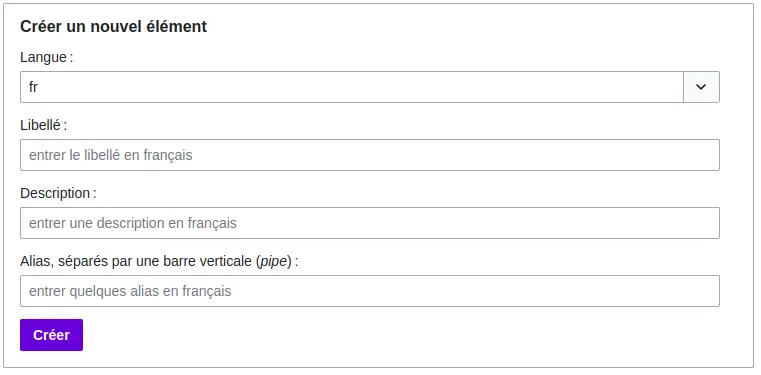Wikidata is a database that anyone can build and modify. The algorithms of search engines like Google or LLMs (like Chat-GPT) rely on it to present information to Internet users when they make queries.
It is little used (or misused) by professionals. This article explains why and how to use it strategically.
Plan
- 1 Wikidata and Wikipedia: what are the differences?
- 2 Why should you be interested in Wikidata as a company, organization or individual?
- 3 Are you eligible for Wikidata?
- 4 How do I create a “record” (= item) on Wikidata?
- 5 How to update your Wikidata entry legitimately
- 6 Examples of Wikidata files for organizations and public figures
Wikidata and Wikipedia: what are the differences?
Wikipedia is an encyclopedia. You’ll find articles written in text form, with detailed information on a subject, written in a neutral and objective way.
Wikidata is a structured database. Rather than articles, it contains organized data on subjects, in the form of “triplets” (subject / property / value). This data feeds Wikipedia, but also other projects such as Google, ChatGPT, etc.
And the big difference? You can have a Wikidata entry even if the subject doesn’t (yet) have its own Wikipedia article. It’s more accessible and often under-exploited, especially by companies.
What they have in common is that these 2 projects and “brands” are licensed, hosted and financed by the Wikimedia Foundation, a non-profit organization based in the USA with “branches” in many countries.
Why should you be interested in Wikidata as a company, organization or individual?
There are at least 3 reasons to be interested in Wikidata in this context.
Reason 1: to gain visibility.
Wikidata feeds all Wikipedia infoboxes. This means that if you add information to it, it can appear on highly-visited pages.
What’s more, Google, ChatGPT, and Bing (and other companies in the industry) use this data to enrich their results. 🤖 This increases your web presence.
However, as almost anyone can have a Wikidata entry, its scope is less than that of a Wikipedia article. Nonetheless, it’s an interesting addition to the list, as it’s relatively simple and quick to set up.
Reason 2: Improve your SEO (Search Engine Optimization) and GEO (Generative Engine Optimization).
Wikidata data is structured to be understood by search engines. This helps improve your search engine optimization (SEO) and your ranking in generative AIs such as Chat GPT.
You can also use Wikidata to generate Schema.org tags, which improve your visibility on Google, especially on the Google Knowledge Panel.
Reason 3: Contribute to a free, multilingual database.
Wikidata is used in over 280 languages, and its data is accessible to everyone, free of charge. So you can reach an international audience by participating in an open, collaborative project.
Are you eligible for Wikidata?
As on Wikipedia, contributors establish criteria for deciding whether or not an entity can have access to your “Wikidata record” (called an element). These criteria are a little more flexible than on Wikipedia.
The entity must tick at least one of these 3 criteria.
Criteria 1 : valid link to another Wikimedia project.
The entity must have at least one valid link to a page in one of the Wikimedia projects (Wikipedia, Wikivoyage, Wikisource, etc.).
💡 Important: links must lead to a main page, not to discussion pages, files or subpages.
Put another way: there must already be a Wikipedia page on this entity. Or on another similar Wikimedia Foundation site, such as Wiktionary, etc.
Empirical evidence 1: Researchers integrated all theses produced at the London School of Economics into Wikidata (without editing Wikipedia). They observed a 47% increase in downloads within six months, and a doubling of traffic from Wikipedia to their archives. [Link to the study (EN)]
Empirical evidence 2: An American consultant added a direct link to Wikidata in his structured data, which led to a significant increase in organic click-through rates and greater visibility in enriched SERP features, such as AI Overviews or featured snippets. It also resulted in a measurable traffic gain from emerging AI search engines such as Perplexity or Copilot. However, there was no noticeable impact on ChatGPT. [Link to the case study (EN)]
Criterion 2: Identifiable and verifiable entity.
The entity must be clearly identifiable, be it a person, a place, an organization or a product, and be described with reliable, public sources.
This may include press articles, scientific publications or references in public databases.
Criterion 3: Structural necessity.
The entity must fulfill a structural need on Wikidata, for example when it is used to enrich other information or to complete existing declarations in other elements.
Source : Wikidata: Notoriété, here.
Wikidata Notability Policy for Organizations
Not every company, NGO, or association can have a Wikidata item. You need to have:
- Independent sources – Your organization must be covered in reliable, published sources (press articles, books, academic publications). A simple website or LinkedIn page is not enough.
- Verifiable information – Data like founding date, headquarters, industry, or key people must be backed up by trustworthy references.
- Clear identity – Your organization should be distinct and recognizable, not just a small project or internal department.
If your organization meets these conditions, you can create a Wikidata item. If not, it will probably be deleted.
👉 Our advice: eligibility is not the only challenge. At Wikiconsult, we observe that most deletions are not due to lack of notability, but to violations of Wikidata’s editorial rules and community standards. That means: wrong formatting, missing references, or adding content that looks promotional. To keep your item online, you must follow Wikidata’s guidelines scrupulously and adopt the right editing practices from the start.
✍️Delegate the creation of your Wikidata entry
We create and upload your Wikidata record so that its data is taken into account by the algorithms of the major search engines, voice assistants and generative artificial intelligences.
How do I create a “record” (= item) on Wikidata?
Here’s a step-by-step guide.
- Create a free Wikidata account: free and quick, but mandatory.
- Check that a record does not already exist for this entity, using the search bar
- Click on Create a new element
- Add key information
- Label (title) and description
- Structured declarations: add information such as date of creation, founder, website, workforce, social networking pages, etc.
- Sources: for some data, you will be asked to provide sources. Mention reliable sources, such as articles, institutional sites or public databases.
- Add a royalty-free image: add an image via Wikimedia Commons to illustrate the entity, if no image already exists on Wikimedia Commons. It can be a photo, a logo, etc.
- Check data links: make sure that each piece of data is linked to its corresponding element. For example, the founder must be linked to an existing person element.
Finally, you must respect the rules of transparencyand declare your personal or professional link with the entity you are creating or updating on Wikidata.

How to update your Wikidata entry legitimately
You have the right to modify the information of an entity you represent, always in a transparent manner.
Go to Wikidata, then to the page dedicated to the entity, and click on edit in the top right-hand corner. You can then modify each item one by one.
Examples of Wikidata files for organizations and public figures
Here are two examples of content for entities with their own “element” on Wikidata.
The Solution Démocratique political party
The chosen wording is the name of the party: “Solution Démocratique”.
A short, one-sentence description was chosen: “French political party”.
A range of information was then added: date founded, business sector, links to website and social networks, logo, country, political ideology, legal form, headquarters, colors, etc.
Writer François Garçon
The chosen wording is his first and last name: “François Garçon”.
The description reads: “Historian and author”.
Several “statements” were then added: sex or gender, nature of the item, languages spoken, occupation, official website, etc.

Written by Albin Guillaud
A Wikipedia contributor since 2014, with Wikiconsult I support businesses, institutions, public figures, and agencies looking to create, update, or monitor their presence on Wikipedia.